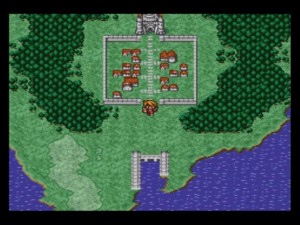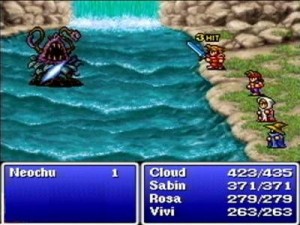 It’s not exactly a secret that many JRPGs, from the very old to the very new, are based on systems originated in tabletop roleplaying games, most notably Dungeons and Dragons. The Final Fantasy series is no exception here, and it’s in these first couple of games that those systems are the most apparent. You may not be able to actually see the dice rolls, and the equipment isn’t as clearly labeled as in, say, Baldur’s Gate, but there are still some pretty obvious similarities present. I’ve always sort of had in the back of my head that individual battles were inspired by D&D in this way (stats affecting whether/how hard characters are hit, random encounter tables determining enemies, loot, and experience, and so forth), but I hadn’t really considered the effect of some of the larger overarching themes until this week.
It’s not exactly a secret that many JRPGs, from the very old to the very new, are based on systems originated in tabletop roleplaying games, most notably Dungeons and Dragons. The Final Fantasy series is no exception here, and it’s in these first couple of games that those systems are the most apparent. You may not be able to actually see the dice rolls, and the equipment isn’t as clearly labeled as in, say, Baldur’s Gate, but there are still some pretty obvious similarities present. I’ve always sort of had in the back of my head that individual battles were inspired by D&D in this way (stats affecting whether/how hard characters are hit, random encounter tables determining enemies, loot, and experience, and so forth), but I hadn’t really considered the effect of some of the larger overarching themes until this week.
Playing Final Fantasy, or really, playing many “old-school” JRPGs, is a lot like sitting down to a tabletop roleplaying session. While I personally have never played D&D proper, I have spent quite a bit of time in other, similar settings, and that experience brings to mind two very distinct areas from which Final Fantasy takes inspiration:
- Compartmentalization: Simply put, you can’t do everything all at once. It just isn’t possible. With, of course, some exceptions, unless you have a really unorganized Dungeon Master, your tabletop sessions should be reasonably self-contained; you’re not simply going to stop in the middle of a dungeon, unless there’s some sort of natural breaking point. Sessions in a larger story may link together, but it’s more like episodes of a TV show than pausing in the middle of a movie. Final Fantasy is like this, frustratingly so at times. There ARE no save points in dungeons. Once you’re in, you’re in for the long haul, so you need to make sure you budget enough time to get through a particular section of game before you start, or you’re going to be very disappointed. And if you die (and you WILL die), you may just find yourself back at the very beginning of the dungeon, or worse, back at the town where you last saved, having lost all of your progress since that point. This hasn’t happened to me yet in this particular playthrough, but I’m sure you can look forward to an all-capital-letters rant when it inevitably does.
 Resource Management: This goes along with the first point. If you can’t back out of a dungeon, you need to be very aware of the gear you take with you as well as the status of your party. In these games, healing and saving before you encountered a boss was “for bitches.” The floors of the dungeon before that point weren’t there to help you get new loot. They were there to wear you down so that while the final confrontation of an area might not have been particularly difficult all on its own, it was an exercise in pulling out every last bit of mojo that you had left just to squeak by with your fighters’ remaining hit points and your mages’ last spells (because there are no potions here to regain your magic points, oh no, friend…you have to be at an inn to get those bad boys back). And when all that was over, you were lucky if they took pity and gave you a warp point back outside instead of making you slog back through the dungeon in your now extra-weakened state to escape. There are few things more depressing than emerging from a nasty boss fight victorious only to be killed on your way out by a random goblin and have to do the entire thing over again. My healer is now able to resurrect party members and take away most of the nastier status ailments (poison, petrification, and the like) so it’s been a while since I’ve had to retreat from a dungeon dragging a statue or a corpse behind me, but that’s pretty sad too. If it’s the healer that gets incapacitated, I’m still kind of boned, actually.
Resource Management: This goes along with the first point. If you can’t back out of a dungeon, you need to be very aware of the gear you take with you as well as the status of your party. In these games, healing and saving before you encountered a boss was “for bitches.” The floors of the dungeon before that point weren’t there to help you get new loot. They were there to wear you down so that while the final confrontation of an area might not have been particularly difficult all on its own, it was an exercise in pulling out every last bit of mojo that you had left just to squeak by with your fighters’ remaining hit points and your mages’ last spells (because there are no potions here to regain your magic points, oh no, friend…you have to be at an inn to get those bad boys back). And when all that was over, you were lucky if they took pity and gave you a warp point back outside instead of making you slog back through the dungeon in your now extra-weakened state to escape. There are few things more depressing than emerging from a nasty boss fight victorious only to be killed on your way out by a random goblin and have to do the entire thing over again. My healer is now able to resurrect party members and take away most of the nastier status ailments (poison, petrification, and the like) so it’s been a while since I’ve had to retreat from a dungeon dragging a statue or a corpse behind me, but that’s pretty sad too. If it’s the healer that gets incapacitated, I’m still kind of boned, actually.
By the way, thank goodness for strategy guides. Without them, my intrepid explorers would probably still be wandering in circles in the woods, commendably over-leveled but hopelessly lost. With them, I have activated two of my party’s four elemental crystals and visited the king of the dragons to obtain some sweet class upgrades. My Warrior is now a Knight, my Thief is now a Ninja, and my Black and White Mages have been bumped up to Wizards. Seems like progress to me.